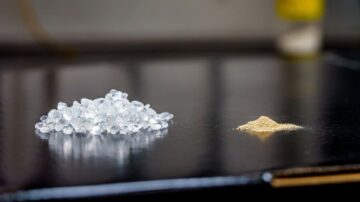Edd Gent in Singularity Hub:
 Getting microbes to eat plastic is a frequently touted solution to our growing waste problem, but making the approach practical is tricky. A new technique that impregnates plastic with the spores of plastic-eating bacteria could make the idea a reality. The impact of plastic waste on the environment and our health has gained increasing attention in recent years. The latest round of UN talks aiming for a global treaty to end plastic pollution just concluded in Ottawa, Canada earlier this week, though considerable disagreements remain.
Getting microbes to eat plastic is a frequently touted solution to our growing waste problem, but making the approach practical is tricky. A new technique that impregnates plastic with the spores of plastic-eating bacteria could make the idea a reality. The impact of plastic waste on the environment and our health has gained increasing attention in recent years. The latest round of UN talks aiming for a global treaty to end plastic pollution just concluded in Ottawa, Canada earlier this week, though considerable disagreements remain.
Recycling will inevitably be a crucial ingredient in any plan to deal with the problem. But a 2022 report from the Organization for Economic Cooperation and Development found only 9 percent of plastic waste ever gets recycled. That’s partly due to the fact that existing recycling approaches are energy intensive and time consuming. This has spurred a search for new approaches, and one of the most promising is the use of bacteria to break down plastics, either by rendering them harmless or using them to produce building blocks that can be repurposed into other valuable materials and chemicals. The main problem with the approach is making sure plastic waste ends up in the same place as these plastic-loving bacteria.
Now, researchers have come up with an ingenious solution: embed microbes in plastic during the manufacturing process. Not only did the approach result in 93 percent of the plastic biodegrading within five months, but it even increased the strength and stretchability of the material. “What’s remarkable is that our material breaks down even without the presence of additional microbes,” project co-leader Jon Pokorski from the University of California San Diego said in a press release. “Chances are, most of these plastics will likely not end up in microbially rich composting facilities. So this ability to self-degrade in a microbe-free environment makes our technology more versatile.”
More here.
